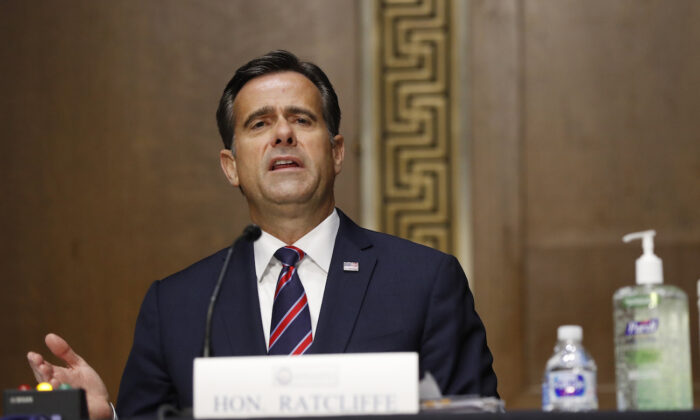Director of National Intelligence John Ratcliffe and Central Intelligence Agency Director Gina Haspel in statements late Monday criticized leaks of classified information, amid recent media reports claiming that Russian military intelligence offered bounties to Taliban-linked terrorists to assassinate U.S. and coalition troops in Afghanistan.
“U.S. and coalition force protection is a critical priority for both the president and the intelligence community,” Ratcliffe said in a statement. “The selective leaking of any classified information disrupts the vital interagency work to collect, assess, and mitigate threats and places our forces at risk. It is also, simply put, a crime.”
“We are still investigating the alleged intelligence referenced in recent media reporting and we will brief the president and congressional leaders at the appropriate time,” Ratcliffe continued. “This is the analytic process working the way it should. Unfortunately, unauthorized disclosures now jeopardize our ability to ever find out the full story with respect to these allegations.”
Haspel in a statement explained the process of intelligence assessments and the effects of intelligence leaks.
 CIA Director Gina Haspel at the U.S. Capitol in Washington on Jan. 8, 2020. (Drew Angerer/Getty Images)
CIA Director Gina Haspel at the U.S. Capitol in Washington on Jan. 8, 2020. (Drew Angerer/Getty Images)“When developing intelligence assessments, initial tactical reports often require additional collection and validation. In general, preliminary force protection information is shared throughout the national security community—and with U.S. allies—as part of our ongoing efforts to ensure the safety of coalition forces overseas. Leaks compromise and disrupt the critical interagency work to collect, assess, and ascribe culpability,” Haspel said.
“Hostile states’ use of proxies in war zones to inflict damage on U.S. interests and troops is a constant, longstanding concern,” she continued. “CIA will continue to pursue every lead; analyze the information we collect with critical, objective eyes; and brief reliable intelligence to protect U.S. forces deployed around the world.
Ratcliffe’s and Haspel’s statements come after The New York Times on Monday cited two anonymous officials that Trump had received a written briefing about the alleged Russian bounties as early as February.
The outlet reported that the Russian bounties allegation was included in a written version of the president’s daily intelligence briefing in late February. CNN on Monday reported that the Russian bounties allegation was included in an intel daily briefing document “sometime in the spring.”
 Speaker of the House Nancy Pelosi (D-Calif.) speaks at her weekly press conference on Capitol Hill in Washington on June 26, 2020. (Tasos Katopodis/Getty Images)
Speaker of the House Nancy Pelosi (D-Calif.) speaks at her weekly press conference on Capitol Hill in Washington on June 26, 2020. (Tasos Katopodis/Getty Images)House Speaker Nancy Pelosi (D-Calif.) also issued a statement late Monday after speaking separately with Ratcliffe and Haspel, saying that she called upon the two to “follow up” on her formal request (pdf) for a “full House briefing” on the intelligence about the Russian bounties.
“I reiterated that a primary purpose of the intelligence community is force protection,” Pelosi said. “Similarly, as Members of Congress, our priority is to keep our men and women in uniform safe. Many serious questions remain regarding what the White House is doing to address threats to American and allied troops and to hold Russia accountable.”
The New York Times and The Washington Post were among the first media outlets to publish the claims regarding Russian bounties, with the Post reporting on June 28 that several American soldiers were believed to have died as a result of the program. The Kremlin has denied such arrangements.
 White House Press Secretary Kayleigh McEnany speaks during the press briefing at the White House in Washington on June 29, 2020. (Jim Watson/AFP via Getty Images)
White House Press Secretary Kayleigh McEnany speaks during the press briefing at the White House in Washington on June 29, 2020. (Jim Watson/AFP via Getty Images)The Pentagon in a statement late Monday said that, to date, it “has no corroborating evidence to validate the recent allegations found in open-source reports” regarding Russian bounties.
White House Press Secretary Kayleigh McEnany said earlier on Monday that there is “no consensus within the intelligence community” on the Russian bounty claims, “and, in effect, there are dissenting opinions from some in the intelligence community with regards to the veracity of what’s being reported.”
President Donald Trump said on June 28 that he was never briefed about the issue. Trump also said that The New York Times must reveal its anonymous source.
Ratcliffe earlier announced, “I have confirmed that neither the president nor the vice president were ever briefed on any intelligence alleged by The New York Times in its reporting yesterday [June 26].
“The White House statement addressing this issue earlier today, which denied such a briefing occurred, was accurate. The New York Times reporting, and all other subsequent news reports about such an alleged briefing are inaccurate,” Ratcliffe added.
Focus News: Intelligence Chiefs Criticize Leaks of Classified Info Amid Reports on Russian Bounties
